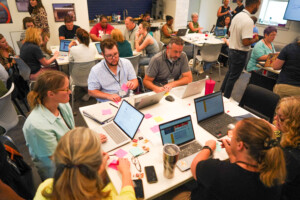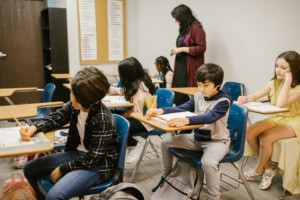Carlos Contreras: Education Policy Director, Intel

- Image via CrunchBase
Tomorrow’s “Education for Innovation” digital town hall where be will Secretary Arne Duncan will make an announcement about the 2009 PISA results. He will be joined by OECD Secretary General Angel Gurría.
The event will be webcast live from the Newseum in Washington, D.C. on Tuesday, December 7 at 8:45 a.m. EST by event partners: The Aspen Institute, PBS NewsHour, Intel Corp. and The Information Technology & Innovation Foundation (ITIF). They’re encouraging viewers to submit questions for Secretary Duncan and the other speakers via Google Moderator, which will be posed by the PBS NewsHour moderators.
Something else to watch for: Rob Atkinson, who heads ITIF, is releasing a STEM study that rumor has will produce some bold policy recommendations that may cause some controversy in the education community. We’ll be watching to find out. Stay tuned for the embedded video link, which we will try to deliver with you through coordination with Intel.
Here’s our interview with Carlos Contreras:
What will be the byproduct of this forum and this conversation with Arne Duncan and other change makers in education?
I think I’m kind of fortunate to have this job. I’ve done this for four years now, in Arizona and now in DC. I’m kind of lucky from that perspective that I work for a company that cares about this issue, and they put a person in place to do that work. What’s going to happen in the ideal world, we’ll wake up and say, we’ve had enough.
The PISA scores are probably going to be worse than the last year they were released. We are in an economic crisis, we have not too many resources, so what is it going to take for us to get over the hump and get past the problem states.
What is Intel’s interest in 2011-2010 in terms of problem areas and the compelling levers that could be pulled to drive change toward digital learning?
At the state level, it’s simply the budget crisis. You have a bunch of new governors walking into horrible fiscal situations. They are going to have to figure out how to allocate resources, and determine what gets funded. I’m hoping that we start looking at some new models in education.
The [other] big lever there is parents. I think that’s the biggest lever. I think every parent wants what is best for their kids. I think we have to show them what that is.
The biggest issue: equity and access. A lot of our schools, especially in the math area, the kids don’t have a highly qualified math teacher. It’s kind of tough for folks to learn math from folks who don’t have the content knowledge.
I’m not advocating for sticking a kid in front of a computer and that’s it. That’s not the answer at all. I think there’s room to look at different models … and put these resources out to more kids.
What does a student need to know how to do in life, and what can be done in the classroom to enhance this type of activity?
This is a good question. We work in the industry, but especially us, we work with people all over the world. Collaboration, the ability to collaborate with other people, the ability to solve problems is so important, the ability to create, because those who create are those who are going to win in this economic climate.
Those are the critical skills that need our kids to learn, and school provides a good foundationally work for that. You can’t collaborate unless you can write. It’s all these foundational skills, and on top of this you have to layer these work force skills.
Will Intel ever run their own charter schools, or launch education ventures that certify students and prepare them for college?
We are very good at making chips. And we are very good at turning our R & D into our products and shrinking things to the size of human viruses. We have done some curriculum work. We have done Intel Math, which is a course for elementary school teachers, because kids approach math differently. This helps the teachers go through this thinking process.
We also do a recognition program. There’s enough innovation going on there in the schools and what we really want to do is…how do you get these point solutions in really good schools and scale them.
What is the role of digital learning in the new model, past R&D? How do we take things that work in one school and scale it across states? There seems to be a continual situation that innovation only happens in isolated pockets. So, how do we spread it?
I think the industry is trying to figure that out. We’re still trying to figure out, what are the good practices. If you ask an educator, they will give you all sorts of different models. I think there is still a lot of innovation that can still go on in this space.
One of the reasons we get a bunch of people together like we do tomorrow, is that we get some of these ideas on the table…hopefully one of those turns into a seed, and from a seed into an apple.
Related articles
- Intel Insight (edreformer.com)
- 18 U.S. Schools Named Intel Schools of Distinction Finalists Schools Honored for Science and Math Programs (eon.businesswire.com)








0 Comments
Leave a Comment
Your email address will not be published. All fields are required.